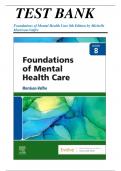Exam (elaborations)
Test Bank for Foundations of Mental Health Care, 8th Edition (Morrison-Valfre, 2023), Chapter 1-32 + Next-Generation NCLEX Case Studies with answers | All Chapters
- Course
- Institution
- Book
Test Bank for Foundations of Mental Health Care, 8th Edition (Morrison-Valfre, 2023), Chapter 1-32 + Next-Generation NCLEX Case Studies with answers | All Chapters
[Show more]



